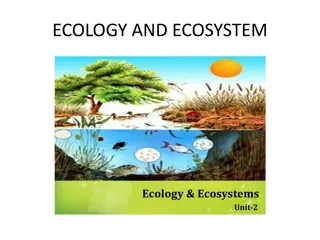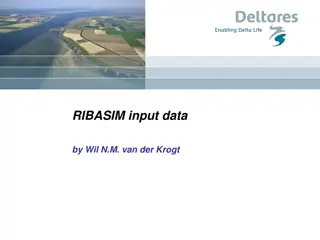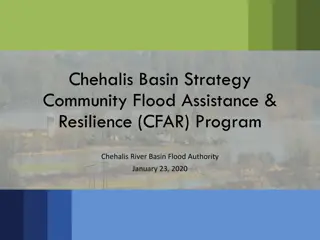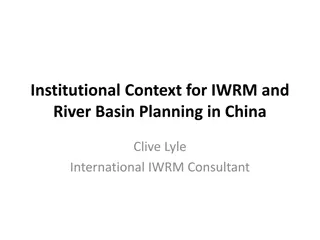Exploring the Vital Role of the Amazon Basin in Integral Ecology
Delve into the significance of the Amazon Basin, which serves as a cradle of biodiversity and plays a crucial role in combating climate change through its rainforests. Learn about the importance of preserving this vital ecosystem and the threats it faces from deforestation and industrial development.
Download Presentation

Please find below an Image/Link to download the presentation.
The content on the website is provided AS IS for your information and personal use only. It may not be sold, licensed, or shared on other websites without obtaining consent from the author.If you encounter any issues during the download, it is possible that the publisher has removed the file from their server.
You are allowed to download the files provided on this website for personal or commercial use, subject to the condition that they are used lawfully. All files are the property of their respective owners.
The content on the website is provided AS IS for your information and personal use only. It may not be sold, licensed, or shared on other websites without obtaining consent from the author.
E N D
Presentation Transcript
Module 2: Lesson 1 INTEGRAL ECOLOGY
WHAT is meant by the Amazon basin? The Amazon Basin is the part of South America that is drained by the Amazon River and its tributaries. The Amazon rainforest lives within the basin.
WHAT What do you know about the Amazon River the world s largest river? Source? in the highlands of the Andes Length? 6992 km long (same distance as St. John s Newfoundland to Vancouver, B.C.) Empties into where? the Atlantic Ocean It is the largest river delta in the world.
WHERE? What countries have some part in the Amazon basin? The Amazon basin is in 9 Countries Brazil (65% of the basin) Columbia Venezuela Bolivia Ecuador French Guyana Guyana Peru Suriname
How are rainforests (and in particular the Amazon rainforest) important? 1. Rainforests are our best defense against climate change. Photosynthesis: the trees and plants in forests use carbon and produce oxygen as a result of photosynthesis (hence the term carbon sink for forests) Water released by plants into the atmosphere through evaporation and plant transpiration influences world climate. Tropical forests cool local climate and help generate rainfall, which affects weather across vast regions.
As the forest is degraded and destroyed -the temperature within the Amazon region rises, -rainfall decreases. The region could become a net source rather than a sink (storage) of carbon dioxide (CO2), as industry is developed where forests used to be.
Why else are rainforests important? 2. Rainforests prevent flooding, soil erosion, and siltation. The tree roots bind the soil together. When the trees die they decay and release the nutrients in the soil. In most cases, the clearing of forests leaves the soil bare coupled with a direct impact of heavy rain on the soil which results in flooding, serious soil erosion, and siltation.
Why else are rainforests important? 3. Sources of Medicine Less than 1% of the world s rainforests have been explored and tested for their pharmaceutical or medicinal components However, 25% of modern medicines have their origin in the rainforest: treatments to leukemia, anti-malarial drugs, high blood pressure, anti-inflammatory drugs, mental illness and much more have all been derived from the rainforests
Why else are rainforests important? 4. Sources of food diversity and industrial products spices, nuts, bananas, coffee, rice, cocoa industrial raw materials such as fibres, resins, dyes and rubber all originate from the tropical rainforests.
Why else are rainforests important? 5. Biodiversity Most rainforest have over 60 million years of plant and animal species evolution that has brought about a huge variety of complex ecosystems and biodiversity. Ecologists and environmentalists estimate that we are losing entire species on a daily basis due to the destruction of the rainforests.
Why else are rainforests important? 6. They provide homes and sustain livelihoods for indigenous peoples Tens of thousands of indigenous people have lived in harmony with the rainforests for centuries, depending on it for their medicines, food, and shelter. Out of kinship, it is important to respect and protect the language, culture, traditional teachings, lives and livelihoods of those who make the rainforest their home.
Why else are rainforests important? 7. Rainforests and all within them are part of God s creation, intricately woven into the large web of sacred beauty in the world. They are not valuable because we say so. They are valuable because God created them. As part of the universe, called into being by one Father, all of us are linked by unseen bonds and together form a kind of universal family (LS 89)
The Amazon Rainforest Amazon lungs of our planet BBC This 4 minute video was released in 2014. In the past few years, deforestation in the Amazon region has increased at an alarming rate.
What is going on in the Amazon rainforest right now?
What is meant by integral ecology in Laudato Si ? Integral ecology recognizes that human culture is connected to all environments: social, political, spiritual, economic, and natural within a global living system that is all inter-connected. Everything is inter-related; the problems of our times can only be solved through an integrative understanding and effort. As an example, if we want to know why a given area is polluted, we must study the workings of society, its economy, its behavior patterns, and the ways it grasps reality. Strategies for a solution demand an integrated approach to combating poverty, restoring dignity to the excluded, and at the same time protecting nature. (LS )















